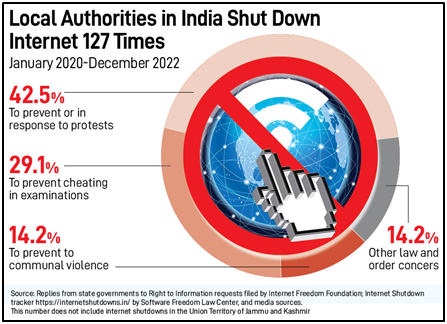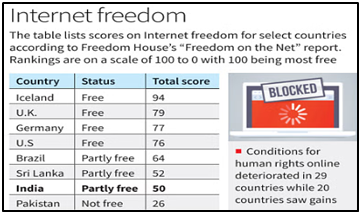Why in News?
For five years in a row, India has topped the globe in imposing internet bans, accounting for over 60% of all blackouts reported between 2016 and 2022.
Though the State imposed internet shutdowns in the last decade have cited national security and threats to public order, rights groups have criticised these shutdowns.
What’s in Today’s Article?
- Internet Shutdowns in India
- Comparing India’s Position with the Global Trends
- Laws Invoked by the Union Government to Suspend Internet
- Criticism of the Indian Government
- Way Ahead for the Indian Government
Internet Shutdowns in India:

- According to data collected by the Software Freedom Law Centre (SFLC), the Indian government imposed a total of 780 shutdowns between 2014 and 2023.
- Data shows India shut down the internet for over 7,000 hours in 2023.
- Internet disruptions in India accounted for more than 70% of total worldwide economic losses in 2020.
- Shutdowns increased during the protests against the Citizenship Amendment Act in 2019, the abrogation of Article 370 in 2019, and the introduction of Farm Bills in 2020.
- Regionally, J&K saw the highest number of shutdowns (at 433) in the last 12 years.
- The longest blackout in 2023 took place in Manipur from May to December, amid ethnic clashes.
- As of February 15 this year, internet shutdowns were active in Haryana amid the farmers’ protests.
Comparing India’s Position with the Global Trends:
- According to the latest Freedom House report, global internet freedom has declined for the 13th consecutive year, and the environment for human rights online has deteriorated in 29 countries.
- The majority of internet outages in the last decade in India were localised to specific districts, cities and villages.
- The trends differ globally: protests are the most common reason for internet shutdowns, followed by information control and political instability.
Laws Invoked by the Union Government to Suspend Internet:
- According to the Indian Telegraph Act, Indian States and UTs can impose an internet shutdown only in case of a “public emergency” or in the interest of “public safety”.
- However, the law does not define what qualifies as an emergency or safety issue.
- Between 2015 and 2022, the biggest share of content censored was done under Section 69A of the IT Act by the Ministry of Electronics and IT and the Ministry of Information and Broadcasting.
- URLs were blocked due to links to organisations banned under the Unlawful Activities (Prevention) Act.
Criticism of the Indian Government:

- The Union government invoked powers under British-era laws to suspend mobile internet as Punjab farmers are holding protests in Delhi.
- Activists have pointed out that India failed to meet the ‘three-part test’ in imposing blackouts in J&K and Manipur.
- Under international law, to block any access to content or invoke coercive measures that violate people’s fundamental rights, countries should check -
- If the action is provided for by law;
- Pursues a legitimate aim; and
- Follows standards of necessity and proportionality.
Way Ahead for the Indian Government:
- The Supreme Court, in the landmark Anuradha Bhasin v. Union of India case, reiterated that internet shutdowns violate fundamental rights to freedom of expression.
- According to the apex court, shutdowns lasting indefinitely are unconstitutional.
- Governments must make shutdown orders public, a provision poorly complied with.









